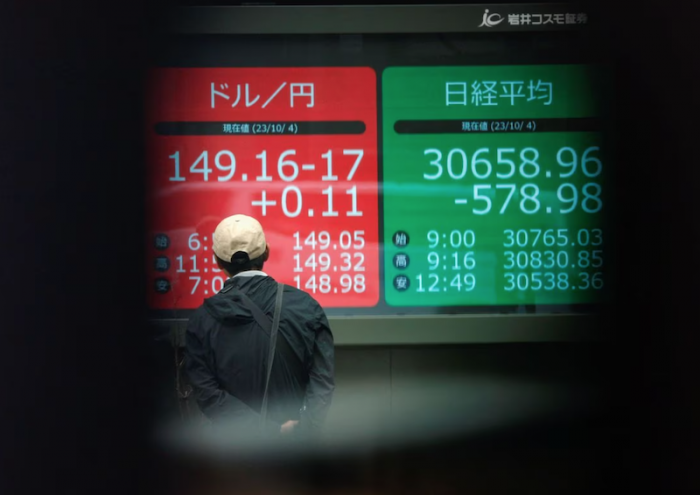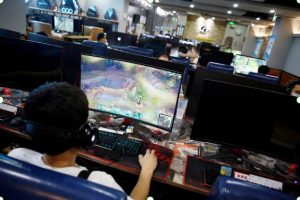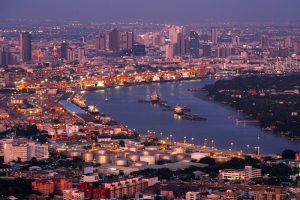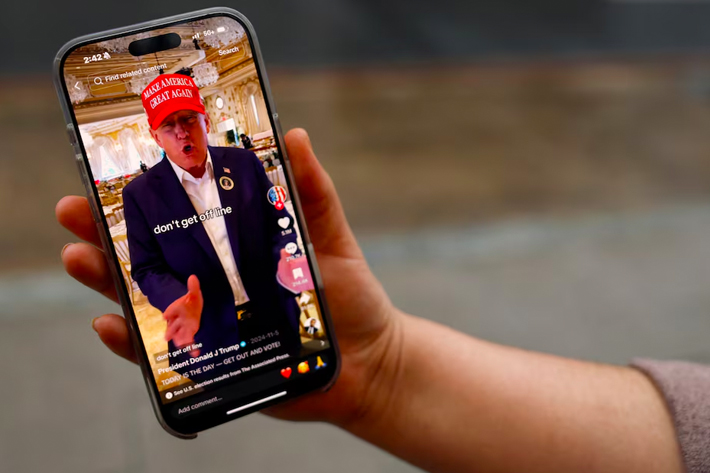Asian share markets plummeted across the board on Monday as US President Donald Trump stood firm on his sweeping tariffs, which he likened to “medicine” that had to be taken to resolve ‘unfair’ trade dealings.
The Hang Seng Index in Hong Kong led the fall, plunging by over 13% – its largest drop since the global financial crisis in 2008, while the Nikkei in Japan sank by 7.8% to lows last seen in late 2023 and shares in Taiwan slumped by close to 10% – a record one-day fall.
After stocks in mainland China and Hong Kong cratered, state media reported that China’s sovereign fund stepped in to try and stabilise the market. The gloomy outlook for trade and fears of a global recession also saw oil prices slide by around 7%.
ALSO SEE: China Hits Back With 34% Tariffs on US Goods; SE Asia Reeling
The carnage came as Trump told reporters that investors would have to take their medicine and he would not do a deal with China until the US trade deficit was sorted out. Beijing, meanwhile, declared that the markets had spoken on their retaliation plans.
EU, Asian leaders hoping to cut tariffs
Speaking to reporters aboard Air Force One on Sunday, Trump indicated he was not concerned about losses that have wiped out trillions of dollars in value from world stock markets.
“I don’t want anything to go down. But sometimes you have to take medicine to fix something,” he said as he returned from a weekend of golf in Florida.
Trump said he had spoken to leaders from Europe and Asia over the weekend, who hope to convince him to lower tariffs as high as 50% due to take effect this week.
“They are coming to the table. They want to talk but there’s no talk unless they pay us a lot of money on a yearly basis,” he said.
Trump’s barrage of tariffs announced last week was met with bewildered condemnation from other leaders and triggered retaliatory levies from China, the world’s No-2 economy.
Israeli PM Benjamin Netanyahu is due to meet Trump later on Monday in a bid to seek a reprieve from the duties.
Over 50 nations start negotiating
Billionaire fund manager Bill Ackman, who endorsed Trump’s run for president, called for the tariffs to be paused to avert an “economic nuclear winter”. “The president is losing the confidence of business leaders around the globe,” he added.
Investors and political leaders have struggled to determine whether Trump’s tariffs are part of a permanent new regime or a negotiating tactic to win concessions from other countries.
On Sunday talk shows, Trump’s top economic advisers sought to portray the tariffs as a savvy repositioning of the US in the global trade order.
Treasury Secretary Scott Bessent said more than 50 nations had started negotiations with the US since last Wednesday’s announcement. Commerce Secretary Howard Lutnick said the tariffs would remain in place “for days and weeks.”
Prime Minister Shigeru Ishiba of Japan, one of Washington’s closest allies in Asia, is also trying to cut a deal with Trump but told parliament on Monday that it may take time.
Investors, however, are not hanging around.
The plunge in the Nikkei has been led by the country’s banks – some of the world’s largest lenders by assets – which have shed almost a quarter of their market value over the last three trading days.
That’s partly because of a report last Friday by the International Trade Centre, a UN body, which said that Japan could lose $17 billion in car export earnings if the US’s 25% auto tariff remains in place. Auto exports make up 20% of the country’s exports, most of which go to the US.
In mainland China, the blue-chip CSI 300 index was down more than 7%, finding a floor only when state media reported China’s sovereign fund Central Huijin was a buyer.
Stocks in South Korea dropped 5%, while MSCI’s gauge of Asia-Pacific shares fell a gut-wrenching 7.8% to head for its largest single-day drop since 2008.
And all of emerging Asia was also underwater, with India’s Nifty 50 sinking 4%.
Even gold, usually a safe haven during times of market stress, was caught up in the market sell-off as investors dumped bullion to cover losses in other trades.
Bets on Fed rate cuts
Investors are now wagering on the mounting risk of recession could see the US Federal Reserve cutting rates as early as next month.
White House economic adviser Kevin Hassett sought to tamp down concerns that the tariffs were part of a strategy to pressure the central bank to lower interest rates, saying there would be no “political coercion”.
Fed chief Jerome Powell has indicated he is in no rush to take action.
Investors were also betting that the imminent threat of recession would outweigh the likely upward shove to inflation from tariffs.
US consumer price figures out later this week are expected to show another rise of 0.3% for March, but analysts assume it is just a matter of time before tariffs push prices sharply higher, for everything from food to cars.
JPMorgan economists now estimate the tariffs will see full-year US gross domestic product (GDP) decline by 0.3%, down from an earlier estimate of 1.3% growth.
Meanwhile, Goldman Sachs said the tariffs could lower GDP growth in China by at least 0.7% percentage points this year. It currently anticipates China to record 4.5% growth in 2025.
That uncertainty has clouded the outlook for other global policymakers. The Reserve Bank of New Zealand, the first major central bank to meet since Trump’s tariff bombshell, is due to cut rates on Tuesday in what economists say could be the first of several this year.
Indonesia’s central bank said on Monday it would “intervene aggressively” in domestic foreign exchange markets when they re-open on Tuesday to prop up its ailing currency.
Tariffs started on Saturday
US customs agents began collecting Trump’s unilateral 10% tariff on all imports from many countries on Saturday. Higher “reciprocal” tariff rates of 11% to 50% on individual countries are due to take effect on Wednesday at 12:01am EDT (4:01am GMT).
Some other governments have already signalled a willingness to engage with the US to avoid the duties.
Taiwan’s President Lai Ching-te on Sunday offered zero tariffs as the basis for talks with the US, pledging to remove trade barriers and saying Taiwanese companies will raise their US investments.
An Indian government official told Reuters the country does not plan to retaliate against a 26% tariff and said talks were underway with the US over a possible deal.
Vietnamese leader To Lam agreed in a phone call with Trump on Friday to discuss a deal to remove tariffs after the Southeast Asian manufacturing hub was slapped with some of the highest duties globally.
Trump called the discussion “very productive”.
- Reuters with additional inputs and editing by Jim Pollard
NOTE: The headline on this report was amended on April 7, 2025 and additional text and links inserted.
ALSO SEE:
Asian Economies Rocked by Trump’s Tariffs, Fears of Trade War
India Likely to Defy Auto Lobby, Cut EV Levies to Appease Trump
Tokyo, Seoul Deny China Claim of Joint Response to US Tariffs
India Shares Sink on US Tariffs Criticism, Xi Urges Trade ‘Tango’
China, Japan, South Korea Boost Trade Ties, as US Tariffs Loom
Carmakers Shares Tumble After Trump Announces 25% Auto Tariff
Xi Calls on Foreign CEOs to Help Protect Supply Chains
























